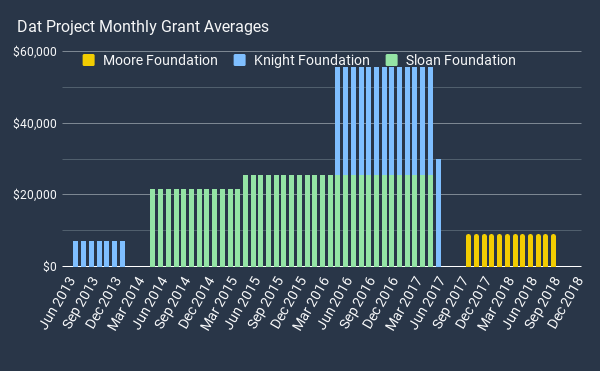Sustainable Funding for New Public Infrastructure: Dat History
Over the summer, the Dat project turned four years old. In that time we've moved from a one-person prototype (see the first readme) to a nonprofit-run project. The Dat Project has always been open and public and we now need to become sustainable. We will carry forward with the same scrappy, open approach in our new chapter as a nonprofit company.
In open source software development you see the best features alongside the bugs and errors. Similarly, we want to show you how we operate and develop as a business, mistakes and all. Today, we'll take a look back at our funding history. This post also comes with one of our first business learning opportunities.
As a small project, depending entirely on a single source of revenue can be dangerous. Our experience over the summer highlighted that risk. In a for-profit startup, they say fund raising is a full-time job. Turns out that is just as true (if not more so) for non-profits. This summer, we learned the value of dedicated fundraising staff as we endured a gap in our funding. So the world zigged, and we zagged: we did part time contract work, consulting, and taught night classes while we hacked on Dat with the rest of our time. I'm excited to say we've got another huge technology update almost out the door: multi-author Dats.
This post is a first in a series on moving the Dat project forward to becoming a sustainable nonprofit. In this series, we will look at common revenue models, challenges in funding general operating costs, and the future of public tech infrastructure. But before we look forward, we must look at the past.
In the meantime, we've received a new grant from the Moore foundation to partially support our work. This new grant will be a great opportunity for us to work closely with leading research labs in the University of California system. We continue to work with our network on additional funding sources, both long- and short-term, as we move towards sustainability. You can also donate to support our work now, and it's tax deductible!
Dat Funding History #
Few open source startups are funded exclusively through grants. We want to use our unique position to help others find ways to support their work. Nadia Eghbal has done great work on researching funding options for open source. She identified infrastructure and public data as two of the major categories that struggle with funding — and we fit into both!
With that in mind, we will begin to open our books and grant history (of course, part of this is legally required as a nonprofit). In this post we will look at the financial side of things. In the future, we'll also work to publish a history of the grant applications and related work (libraries.io is a great example of what we'll hope to do).
Dat Expenses #
The expenditures side of our budget is pretty straightforward, but slightly less transparent. Almost all of our grant revenue has gone towards developer salaries or travel (with a small percentage to our accountant). For most of our grants, we've all gotten paid the same salaries of $96,000 per year (as contractors, without benefits and pre-tax). Thanks to generous offers we do not pay for hosting or many services we use; nor do we have offices or other traditional business expenses. We will start to put processes in place to make our salaries and expenses more transparent in the future.
Dat Revenue #
Dat Project has received five grants totaling $1.48 million over our four year history. Until very recently, grants have been our sole source of revenue. We've now started to accept donations (we are working on storing anonymous donation data on Dat so we can make more nice graphs!). We also received $15k to pay for our incorporation and nonprofit application (not shown below).
Taking rough averages of our grants over time, you can see our monthly revenue for the past four years and looking towards the upcoming year. Notice the few funding gaps we've gone through, including the most recent dip:

In the graph, you can see each of the five grants we've received:
- June 2013, $50k - Knight Foundation, Prototype Fund (7 months)
- April 2014, $260k - Sloan Foundation, General Support (1 year)
- April 2015, $640k - Sloan Foundation, General Support (2 years)
- April 2016, $420k - Knight Foundation, news challenge (1 year)
- Sept. 2017, $110k - Moore Foundation, Dat in the Lab (1 year, $180k total)
The initial grant was focused on the civic data use case, after Max Ogden's experience with Code for America. With the Sloan foundation, Dat shifted our focus to scientific use cases. We've continued to have our eye on both types of users as we have made Dat a more general purpose file protocol with other applications in libraries, software development, and the decentralized web.
Moving forward, we will continue to pursue grants for a portion of our projects but are looking to diversify sources of support in order to become sustainable. We are exploring ways we can fund the rest of the team in the next few posts in this series. Keep an eye out, you can also follow us on Twitter.